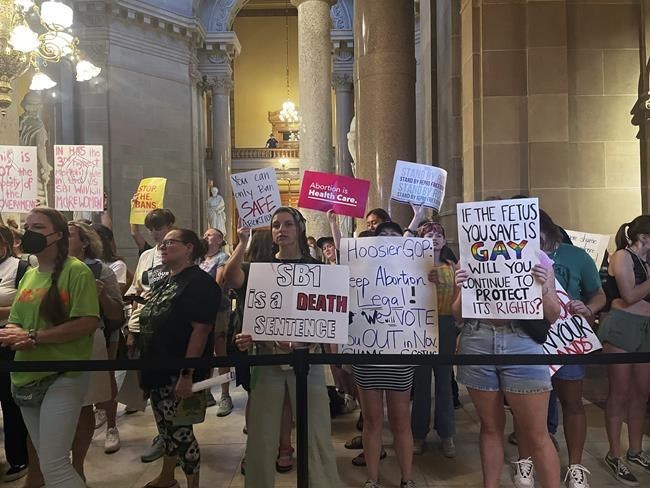INDIANAPOLIS (AP) — The Indiana Supreme Court issued an order Wednesday that prevents the state from enforcing a Republican-backed abortion ban while it considers whether the ban violates the state constitution.
The court said in the order that it was taking over appeals of a judge’s decision last month that blocked the law a week after it took effect. It denied a request from the state attorney general’s office to set aside the preliminary injunction and scheduled a hearing on the lawsuit filed by abortion clinic operators for Jan. 12.
Owen County Judge Kelsey Hanlon blocked the law from being enforced, writing that “there is reasonable likelihood that this significant restriction of personal autonomy offends the liberty guarantees of the Indiana Constitution” and that the clinics will prevail in the lawsuit.
The ban was approved by the state’s Republican-dominated Legislature on Aug. 5 and signed by GOP Gov. Eric Holcomb. That made Indiana the first state to enact tighter abortion restrictions after the U.S. Supreme Court eliminated federal abortion protections by overturning Roe v. Wade in June.
The five-member Supreme Court, all of whom were appointed by Republican governors, did not explain their decision. The order, signed by Chief Justice Loretta Rush, said “a majority” of the court agreed with its provisions but gave no further details.
The Indiana ban aimed to replace state laws that generally prohibited abortions after the 20th week of pregnancy and tightly restricted them after the 13th week. The ban includes exceptions allowing abortions in cases of rape and incest, before 10 weeks post-fertilization; to protect the life and physical health of the mother; and if a fetus is diagnosed with a lethal anomaly.
Indiana’s seven abortion clinics were to lose their state licenses under the ban — which only permits abortions within its narrow exceptions to take place in hospitals or outpatient surgical centers.
The American Civil Liberties Union of Indiana, which is representing the abortion clinics, filed the lawsuit Aug. 31. It argued that the ban would “prohibit the overwhelming majority of abortions in Indiana and, as such, will have a devastating and irreparable impact on the plaintiffs and, more importantly, their patients and clients.”
Ken Falk, the ACLU of Indiana’s legal director, pointed to the state constitution’s declaration of rights, including “life, liberty and the pursuit of happiness” in arguing before the county judge that it included a right to privacy and to make decisions on whether to have children.
The state attorney general’s office said the court should uphold the ban, saying arguments against it are based on a “novel, unwritten, historically unsupported right to abortion” in the state constitution.
The attorney general’s office had asked the Supreme Court to take over the case, bypassing the typical intermediate step of it being considered by the state appeals court.
The ACLU and the state attorney general's office did not immediately comment on the decision. Senate President Pro Tem Rodric Bray repeated a previous statement saying “It was always our intent to draft a bill that could withstand a constitutional challenge, and I hope to see that will be the case.”
The leader of Indiana’s most prominent anti-abortion group said it was “deeply disappointed” and estimated that at least 3,000 abortions will take place in the state while awaiting a decision from the court.
“Although we are confident the law will be upheld, it will be far too late for those whose lives will be lost as this is argued in the courts,” Indiana Right to Life CEO Mike Fichter said in a statement.
Indiana’s ban followed the political firestorm over a 10-year-old rape victim who traveled to the state from neighboring Ohio to end her pregnancy. The case gained wide attention when an Indianapolis doctor said the child came to Indiana because of Ohio’s “fetal heartbeat” ban.
An Ohio judge has blocked that state's law while a court challenge to it proceeds.
With Indiana's law remaining on hold and a pre-statehood Arizona law blocked last week, bans on abortion at any point in pregnancy are in place in 14 states. In Wisconsin, clinics have stopped providing abortions amid litigation over whether an 1849 ban is in effect. Georgia bans abortions once cardiac activity can be detected and Florida, Arizona and Utah have bans that kick in after 15 or 18 weeks gestation.
The question of whether the Indiana Constitution protects abortion rights is undecided.
A state appeals court decision in 2004 said privacy was a core value under the state constitution that extended to all residents, including women seeking abortions. But the Indiana Supreme Court later set aside that ruling without addressing whether the state constitution included such a right.
Hanlon, a Republican who was first elected in 2014 as a judge in the rural southern Indiana county, wrote in her injunction order that Indiana’s constitution “is more explicit in its affirmation of individual rights and its limitation of legislative power to intrude into personal affairs” than the U.S. Constitution.
Tom Davies, The Associated Press


